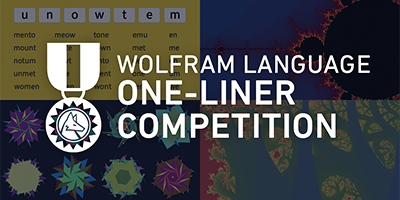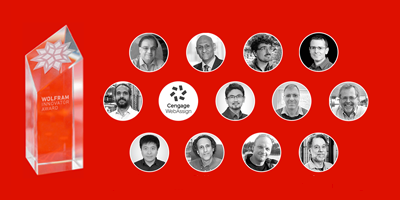The Wolfram High School Summer Camp Went Virtual, and It Was an Experience!
For more on Wolfram’s summer education programs, read our post about the Wolfram Summer School.

This year marked the ninth annual Wolfram High School Summer Camp, and it was a truly amazing experience. Forty-four students joined us remotely from around the world—from almost on the doorstep of Wolfram’s headquarters in Illinois to as far-flung as Kazakhstan, Germany, Russia, South Korea and India. They dedicated two weeks to learning the Wolfram Language, creating remarkably high-level independent projects and developing strong computational thinking skills. Our students had the opportunity to learn from subject experts from Wolfram Research, their mentors and teaching assistants (TAs) and, of course, our CEO Stephen Wolfram, who met with each student to discuss their projects.

Location distribution of the 2020 Wolfram Summer Camp students.
The overarching goal of the Wolfram High School Summer Camp is for talented young people to develop their knowledge, experience and skills by working on an independent project, supported by a mentor and other staff members. Each year at camp, we emphasize the concept of computational X—the idea that for any given subject, there is or can be a computational extension. In this manner, our students managed to apply computational analysis skills to subjects ranging from vexillology (the study of flags), to ornithology (the study of birds), to acoustics and linguistics. Other students worked on more traditional projects, such as data science, machine learning and computational math and physics.
For each student, the final output was a computational essay: an interactive notebook combining narrative, code and output to explain and explore their project. This year’s computational essays were of an exceptionally high standard, especially considering that the students had fewer hours of contact time with their mentors than in previous years spent on campus. Students reported that project time was their favorite part of camp, indicating that we successfully created an atmosphere of hard, productive work, but also one where students could enjoy themselves and make new friends.
This year, we built a curriculum around an active approach to learning. Over the course of the first two days, classes focused on helping students learn the functional programming paradigms and structures of the Wolfram Language, deep diving into the details to give students a full picture of what can be achieved. Each class was structured to provide plenty of time for active learning via small group activities, mini-projects and discussion. Students were able to build a dozen or so mini-projects of increasing complexity before moving on to their own individual projects. These mini-projects helped students to develop skills such as structuring readable code, user experience design, debugging and optimization.
Throughout the camp, mentors and TAs delivered short lectures focused on applications of the Wolfram Language. From computational farming to how step-by-step functionality is built in Wolfram|Alpha, students had the opportunity to see a wealth of real-life, and in some cases production-level, code. This helped them to visualize how their own code should be structured so that it can be useful to others in the future.
Challenges and Solutions for Running an Online Camp
As with many educational programs this year, we had to make the decision to move online for the first time. When planning the Wolfram Summer Camp, we had three main concerns: that students would lose out on the dynamic social environment, that students wouldn’t get the level of support they needed from our mentors and that students wouldn’t have the technology, time and space available in their homes to complete their projects effectively.
Unlike at a regular summer camp where campers are rarely, if ever, alone, we would have no transitional times, no opportunities for whispering in class and no chance to play Truth or Dare into the early hours of the morning. A central piece of the Summer Camp that we successfully recreated was the role of junior staff. The TAs brought energy and acted as a bridge between the adult staff and the campers. They organized a range of activities, from a 30-minute warmup session first thing each morning, to a different lunchtime social activity each day, to evening slots for relaxation. Some of the highlights included a virtual escape room, a Bob Ross–inspired painting hour and a talent show. Students became particularly fond of quick games such as Skribbl (a kind of online Pictionary), the Wiki Game and GeoGuessr. With all of these activities and the enthusiasm brought by the TAs, we were able to keep students happy and engaged.

Some of our students’ creations from a Bob Ross–inspired painting hour.
During an in-person camp, students spend project time sitting with their mentor group, keeping each other on task, taking dance breaks and helping each other with bugs. To recreate this dynamic environment, staff and students actively engaged over Zoom (video/audio) and Slack (messaging). Using Zoom allowed us to share video for face-to-face communication as well as create breakout rooms where students (and sometimes a mentor or TA) could play a game or work on their projects or other coding challenges together. Mentors and TAs worked hard to ensure that project time was productive and engaging by sharing music through Zoom, taking time at the start and end of sessions to play a quick game, employing the Pomodoro Technique and, in one case, regular dance breaks!

Slack allowed us to build on what Zoom offered by providing flexible messaging with channels set up for academic and social use. Over the course of two weeks, the 44 students and 18 staff members sent over 17,000 messages (more than 1,100 every day!) and shared over 1,300 files. In concert, Zoom and Slack made it possible to manage the various needs of students by flexibly allowing mentors and TAs to move between groups as well as answer questions in Slack directly.
Our final concern was less easily solved. At physical camp, it is relatively easy to ensure that each student is healthy, happy, fed, hydrated, taking enough breaks and is physically safe. It’s also relatively easy for us to solve their technical problems. In some ways, virtual camp is a more equitable experience—camp itself was cheaper, and no one had to pay to fly to Boston. Virtually, however, we ran into some problems with some students using shared or old computers; struggling to find quiet environments where they could sit comfortably for long periods of time; and having issues with Wi-Fi, electricity and time zones when camp ran across their nighttime. While hardware- and utilities-related problems were unsolvable on the side of camp staff, we were able to run computationally costly code through Amazon Web Services (AWS) and rely on Slack for continued communication with students when Wi-Fi was down.

Participants and staff members from the 2020 Wolfram Summer Camp.
What’s Next after Camp?
Selected students from camp are asked to join various educational programs offered by Wolfram Research. Students who did a project closely related to Stephen Wolfram’s Physics Project will be joining a new initiative there to get young people participating in active scientific research. Other students will be joining the Wolfram Emerging Leaders Program (WELP), a semester-long experience designed to build on what students learned at camp.
Where students at camp work to produce a project independently in a short period of time, students in WELP work in a team over the course of 15 weeks to follow the entire design-thinking process from ideation to implementation. WELP students present their projects in the form of a computational essay and a poster session. The students benefit from longer-term mentoring, a structured program and the opportunity to form close bonds with their teammates.
Other students will go on to adapt the work they did at camp to make it into functions for the Wolfram Function Repository, a dataset for the Wolfram Data Repository or an interactive Demonstration for the Wolfram Demonstrations Project. Older students may move up to the Wolfram Summer School next year, intern at Wolfram Research or join the Wolfram Student Ambassador Program to represent Wolfram at their schools or universities. Younger students may join Stephen Wolfram’s Computational Explorations club or return to camp next summer to join us (hopefully) in Boston.
With 92% of students rating the camp “Excellent” overall and 90% of students feeling very happy with their final projects, it is safe to say that Wolfram High School Summer Camp in 2020 was a success. On our end, we loved helping the students to grow and develop their skills and their projects, and it’s been a joy to read through their computational essays and see what amazing work they all accomplished in such a short space of time.
| For more hands-on Wolfram Language courses and workshops, check out the latest Wolfram U events. |



Comments